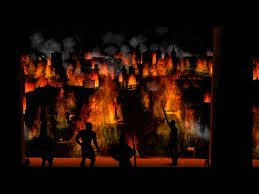A major event in church history was the great fire of Rome. The fire began on July 19, AD 64. The historian Tacitus stated that the fire burned for five and a half days. Rome had been divided into fourteen districts. Eleven districts were ravaged by the fire with three of them being completely destroyed.
Pliny, another historian wrote about the fire with very little details. Several other historians never mentioned the fire. In one account some 132 houses and over four blocks burned in six days.
Cassius Dio claimed that the Emperor Nero sang the song “Sack of Ilium” while dressed in costumes from the theatre. Tacitus reported that Nero was in Antium at the time of time of the fire. His report concluded that the playing of Nero on the lyre and his singing while Rome burned was only a rumor. According to Tacitus when Nero heard about the fire he rushed back to Rome to organize a relief effort. It was reported that Nero paid for some of the rebuilding from his own personal funds and that he opened the palace as shelter for the homeless and provided food to be delivered to the survivors.
What we do know is that Nero developed a new plan for the city of Rome which required greater space between houses, new homes were built with brick, and they were built on wider roads. Nero built a new palace in an area that had been cleared by the fire.
What is the impact or importance of this fire in regards to Christian history? No one knows for sure who or how the fire began. To this day no one knows if the fire was accidental or an act of arson. According to Tacitus a good number of Roman citizens accused Nero of starting the fire. In order to steer suspicion away from himself Nero placed the blame of the fire on Christians. Nero even produced believers who “confessed” to starting the fire. However, it became known that these believers “confessed” under extreme torture.
As a result, Nero ordered Christians to be thrown to the dogs, while many were crucified, and some were burned as “lights” in his gardens. Tacitus gives the following account:
“As a consequence, to get rid of the report, Nero fastened the guilt and inflicted the most exquisite tortures on a class hated for their abominations, called Christians [or Chrestians] by the populace. Christus, from whom the name had its origin, suffered the extreme penalty during the reign of Tiberius at the hands of one of our procurators, Pontius Pilatus, and a most mischievous superstition, thus checked for the moment, again broke out not only in Judaea, the first course of the evil, but even in Rome, where all things hideous and shameful from every part of the world find their centre and become popular. In accordance, an arrest was first made of all who pleaded guilty; then, upon their information, an immense multitude was convicted, not as much of the crime of firing the city as of hatred against mankind. Mockery of every sort was added to their deaths. Covered with the skins of beasts, they were torn by dogs and perished, or were nailed to crosses, or were doomed to the flames and burnt, to serve as a nightly illumination, when daylight had expired.”
There are five stories that have existed from AD 64 that attempt to explain this hideous and devastating fire:
- Motivated by a desire to destroy the city, Nero secretly sent out men pretending to be drunk to set fire to the city. Nero watched from his palace on the Palatine Hill singing and playing the lyre.
- Motivated by an insane whim, Nero quite openly sent out men to set fire to the city. Nero watched from the Tower of Maecenas on the Esquiline Hill singing and playing the lyre.
- Nero sent out men to set fire to the city. Nero sang and played his lyre from a private stage.
- The fire was an accident. Nero was in Antium.
- The fire was caused by Christians.
Today, modern students of this disaster tend to agree with Tacitus and believe that Nero probably did not cause the fire. First, the fire started over a mile from where Nero would build his palace, the fire did destroy a portion of Nero’s own place, the fire started after a full moon which arsonists would have avoided in order not to be seen. It was never proven that Christians started the fire. It is quite possible that it was simply a tragic accident.
_________________________________________________
Join the Gospel-driven Disciples each Thursday as we unlock the meaning of various theological terms, definitions, and we talk about theological news and events that have affected Christianity and the Church through history.


6 comments:
Thanks for the history. The persecution of Christians during this period were heinous. It's truly difficult for me to imagine the atrocities they faced on a daily basis. What a blessing for us that their unwavering faith back then allows us to freely worship today.
Happy Thursday! ☺
Very interesting history lesson. It is incomprehensible what people have suffered for the cause of Christ. I wonder how many would follow Christ today under the same persecutions. Very thought-provoking.
Thanks for the history lesson. I was tought that nero did it and was happy about it, then blamed the Christians, and as thow it was undeniadle truth. I did not know there were so many diffrent stories out there.
This is quite fascinating, thanks for sharing.
Wow, the stories from history are incredible. And the punishments for the "accused" were horrendous. I agree with Darlene's comment.
I have never heard this story and am so glad you shared it. I have learned so much Christian history here. Thank you Gregg!
Wow! I have to echo Darlene's statement/question. Blessings!
Post a Comment